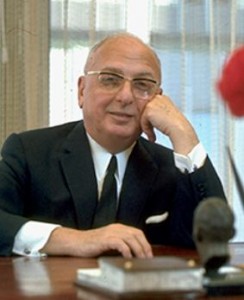Samuel Bronfman (1889-1971) immigrated to Canada from Bessarabia, Moldova, fleeing the pogroms of the Russian Empire. From tobacco farming to selling firewood, working in a sawmill, and building railways, Bronfman bounced around to make a living. The family eventually bought a small hotel and Sam soon realized that most of the profit was coming from alcohol. In 1924 he opened a distillery in Montreal which went on to make huge profits, much of which came from bootlegging to the U.S., taking advantage of America’s prohibition era. In 1928, Bronfman purchased Ontario’s Seagram Company and adopted its name. It would become the world’s largest producer of alcoholic beverages (with over 250 different brands), a title it held until the company was bought out by several corporations, including Coca-Cola. Sam Bronfman was also a noted philanthropist and served as president of Canada’s Jewish Congress for over 20 years. One of McGill University’s main patrons, he was awarded the Order of Canada.
The same honour was awarded to Samuel’s son Charles Bronfman (b. 1931). Aside from business, Charles is famous for bringing a major league baseball team to Montreal, the ill-fated Expos. More significantly, along with Michael Steinhardt, he founded (and funds) Taglit Birthright, which has now brought over 220,000 young Jews around the world on free trips to Israel. Bronfman has signed the Giving Pledge, vowing to leave more than half of his wealth to charity. Part of that is creating the $100,000 Charles Bronfman Prize, honouring individuals who have contributed to humanitarian causes. A quirky fact: Charles is co-founding chairman of Historica, the company that brought you all those fun ‘Heritage Minutes’ on Canadian TV. He said, “If television can use 30 seconds or 60 seconds to persuade people that Cadillacs or cornflakes are interesting, couldn’t we also use that short piece of time to persuade Canadians that their history is interesting? You tell me how to do it, and I’ll fund it.”
Words of the Week
If you wait until you find the meaning of life, will there be enough life left to live meaningfully?
– Rabbi Menachem Mendel Schneerson, The Lubavitcher Rebbe


